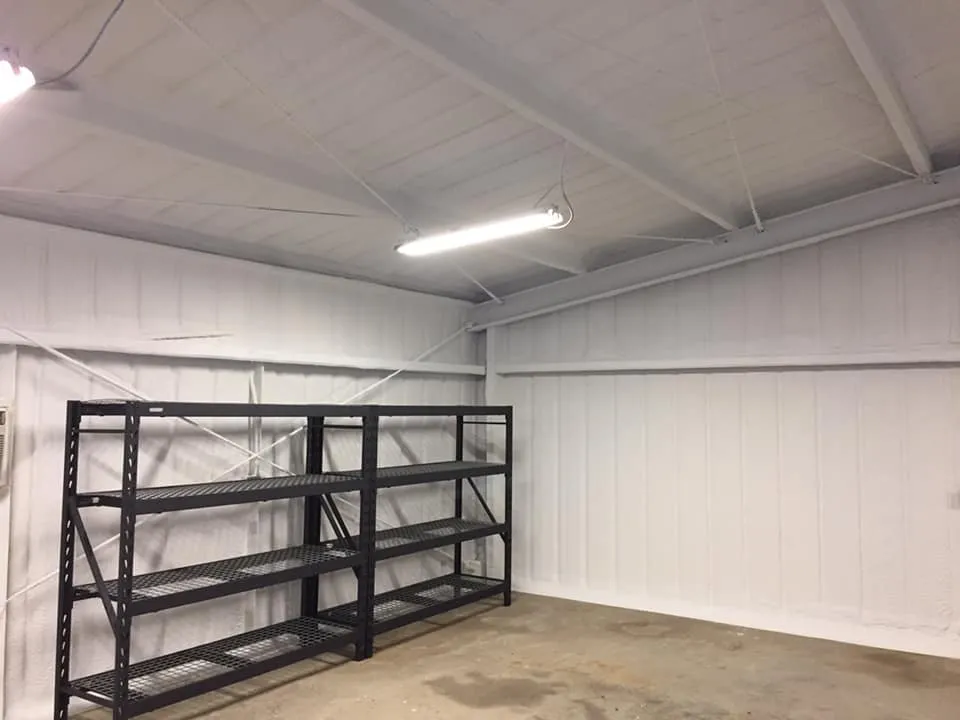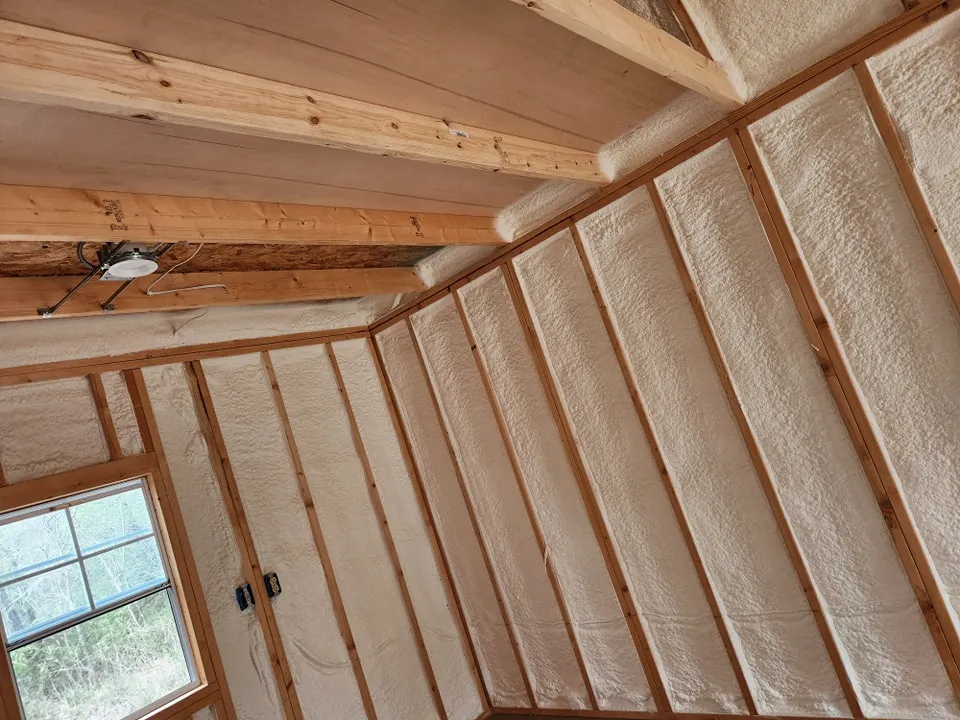
Spray foam insulation significantly outperforms fiberglass in Ellis County’s climate conditions, providing superior air sealing capabilities and higher R-values per inch. While fiberglass offers initial cost advantages, spray foam insulation delivers better long-term energy efficiency and moisture control in Texas’s hot, humid summers and variable winter temperatures.
Ellis County homeowners face unique insulation challenges due to the region’s climate fluctuations, ranging from freezing winter nights to scorching summer days exceeding 100°F. Professional insulation contractors with over two decades of experience in North Texas recognize that material selection directly impacts energy bills, comfort levels, and structural integrity. This comprehensive analysis examines both insulation types through practical application data, performance metrics, and regional climate considerations.
Ellis County’s subtropical climate demands insulation materials that handle temperature extremes and humidity variations effectively. Spray foam insulation creates a continuous thermal barrier that eliminates air leakage, while fiberglass relies on trapped air pockets that can lose effectiveness when compressed or exposed to moisture.
The region’s average annual temperature of 65°F masks significant seasonal variations. Summer temperatures frequently reach 95-105°F with humidity levels above 70%, creating conditions where air infiltration through gaps around fiberglass batts can increase cooling costs substantially. Winter lows dropping to 25-35°F require consistent thermal protection to prevent heat loss and potential pipe freezing in unconditioned spaces.
| Performance Factor | Spray Foam (Closed Cell) | Spray Foam (Open Cell) | Fiberglass Batts | Blown Fiberglass |
|---|---|---|---|---|
| R-Value per Inch | 6.0-7.0 | 3.5-4.0 | 3.1-3.8 | 2.2-4.2 |
| Air Sealing Capability | Excellent | Good | Poor | Fair |
| Moisture Resistance | Superior | Moderate | Poor | Poor |
| Vapor Barrier Properties | Yes | No | No | No |
| Installation Thickness Needed | 2-3 inches | 3-4 inches | 6-12 inches | 8-16 inches |
Bonus Tip: Ellis County’s clay soil conditions can cause foundation settlement, creating gaps around penetrations. Spray foam’s expansive properties automatically seal these developing air leaks, while fiberglass requires periodic inspection and replacement in affected areas.

Energy consumption data from Ellis County utility providers indicates that homes with spray foam insulation typically achieve 15-30% lower heating and cooling costs compared to fiberglass-insulated structures. This efficiency gain stems primarily from the elimination of air infiltration rather than just thermal resistance values.
According to Texas State Energy Conservation Office data, the average Ellis County home loses 25-40% of conditioned air through uncontrolled air leakage. Fiberglass insulation does not address this fundamental issue, allowing heated or cooled air to escape through gaps around electrical outlets, plumbing penetrations, and structural joints. Spray foam insulation expands to fill these voids, creating an integrated thermal and air barrier system.
Summer cooling loads in Ellis County can account for 60-70% of annual energy consumption. Spray foam’s ability to prevent humid outdoor air from infiltrating conditioned spaces reduces both sensible and latent cooling loads. Fiberglass insulation allows moisture-laden air to enter attic and wall cavities, forcing HVAC systems to work harder to maintain comfortable humidity levels.
Bonus Tip: Install spray foam insulation during Ellis County’s cooler months (November through February) for optimal curing conditions. High summer temperatures can affect application quality and worker safety during installation.
D&D Insulation LLC specializes in comprehensive insulation solutions tailored to Ellis County’s specific climate requirements. Each installation begins with detailed energy audits to identify optimal insulation strategies for individual properties.
Open Cell Insulation: Ideal for interior applications where vapor permeability is desired, providing excellent sound dampening alongside thermal performance for Ellis County homes with noise concerns from nearby highways or commercial areas.
Closed Cell Insulation: Superior choice for exterior applications, basement walls, and areas requiring moisture resistance, particularly effective in Ellis County’s humid conditions and storm-prone environment.
Fiberglass Batt Insulation: Cost-effective solution for specific applications where air sealing is already addressed through other methods, suitable for Ellis County homeowners with budget constraints requiring immediate thermal improvement.
Spray Foam Roof Insulation: Essential for Ellis County’s intense summer sun exposure, providing both thermal barrier and structural reinforcement for aging roof systems common in the region’s older neighborhoods.
Closed-cell spray foam provides superior performance during hot weather by eliminating air infiltration and providing higher R-values in thinner applications, crucial for attic spaces with limited headroom.
Fiberglass loses significant thermal resistance when moisture levels exceed 1% by weight, while closed-cell spray foam maintains full R-value even with moisture exposure common during Ellis County’s humid periods.
Schedule spray foam installation during moderate temperature periods (60-80°F) for optimal curing, typically October through April in Ellis County. Fiberglass installation can occur year-round but requires careful moisture management during humid periods.
Successful insulation projects in Ellis County require understanding local climate impacts, building construction methods, and long-term performance expectations. Spray foam insulation delivers superior energy efficiency and durability advantages that typically justify higher initial investment over 15-20 year periods.
Fiberglass insulation remains viable for specific applications where air sealing is addressed through other methods and initial budget constraints are primary concerns. However, total system performance depends on comprehensive air sealing regardless of insulation material selected.
Professional assessment of your specific property conditions, energy usage patterns, and comfort requirements provides the foundation for optimal insulation material selection in Ellis County’s challenging climate conditions.
Selecting appropriate insulation materials requires thorough understanding of Ellis County’s unique climate challenges and building characteristics. Professional consultation ensures optimal material selection and installation practices that maximize energy savings and comfort improvements.
D&D Insulation LLC provides comprehensive insulation assessments and installation services throughout Ellis County. Contact our experienced team at [email protected] or (903) 389-5705 to schedule detailed property evaluation and receive customized insulation recommendations based on your specific needs and budget considerations.
Closed-cell spray foam typically maintains effectiveness for 50+ years in Ellis County’s climate, while fiberglass batts may require replacement every 15-25 years due to settling and moisture absorption from humidity exposure.
Yes, spray foam can be applied over existing fiberglass in many applications, though removal may be necessary in areas with moisture damage or pest contamination. Professional assessment determines optimal upgrade strategies.
Spray foam requires minimal maintenance once properly installed, while fiberglass needs periodic inspection for settling, moisture damage, and pest intrusion, particularly in Ellis County’s humid environment.
Initial spray foam installation typically costs 2-3 times more than fiberglass, but energy savings over 10-15 years often recover the additional investment through reduced utility bills in Ellis County’s extreme climate conditions.
Closed-cell spray foam provides superior storm resistance by adding structural strength and preventing water infiltration, while fiberglass can be displaced by high winds and damaged by water exposure during severe weather events.